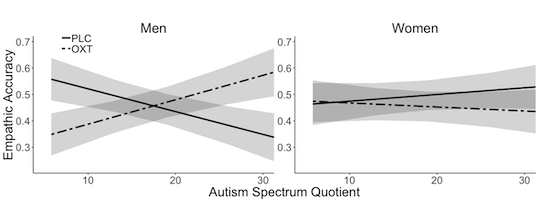Oxytocin Selectively Improves Empathic Accuracy: A Replication in Men and Novel Insights in Women
Abstract:
Previously, oxytocin, a neuropeptide implicated in human social cognition and behavior, was shown to improve people’s ability to dynamically track another’s emotional state (“empathic accuracy”) specifically for less socially proficient individuals—i.e., healthy adults who score higher on the Autism Quotient (AQ); conversely, oxytocin had no effect on empathic accuracy for more socially proficient individuals, who performed well following oxytocin and placebo (Bartz et al., 2010). Here, we aimed to replicate this finding, and investigate the effects of oxytocin on empathic accuracy in women. To date, women are seriously underrepresented in human oxytocin research and it is not known whether the effects observed in male-only samples apply to women. To this end, we administered intranasal oxytocin/placebo (within-subject) to 31 men and 40 women and measured empathic accuracy. Replicating Bartz et al. (2010), oxytocin selectively improved empathic accuracy for men who scored higher on the AQ, whereas oxytocin did not benefit their lower AQ counterparts. Conversely, we found no effect of oxytocin on empathic accuracy for women (regardless of their AQ score). In addition to speaking to reliability, this research is important given interest in using oxytocin to augment social functioning in some psychiatric disorders marked by social cognitive impairments. More generally, this research adds to our understanding of the biological systems that support human sociality and provide further evidence for role of oxytocin therein.
